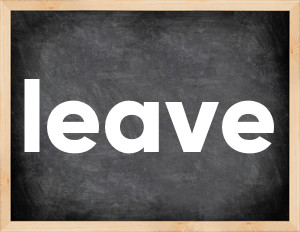 The English verb 'leave' is pronounced as [li:v].
The English verb 'leave' is pronounced as [li:v].
Related to:
irregular verbs.
3 forms of verb leave: Infinitive (leave), Past Simple - (left), Past Participle - (left).
Here are the past tense forms of the verb leave
👉 Forms of verb leave in future and past simple and past participle.
❓ What is the past tense of leave.
Leave: Past, Present, and Participle Forms
| Base Form | Past Simple | Past Participle |
|---|---|---|
| leave [li:v] |
left [lɛft] |
left [lɛft] |
What are the 2nd and 3rd forms of the verb leave?
🎓 What are the past simple, future simple, present perfect, past perfect, and future perfect forms of the base form (infinitive) 'leave'?
Learn the three forms of the English verb 'leave'
- the first form (V1) is 'leave' used in present simple and future simple tenses.
- the second form (V2) is 'left' used in past simple tense.
- the third form (V3) is 'left' used in present perfect and past perfect tenses.
What are the past tense and past participle of leave?
The past tense and past participle of leave are: leave in past simple is left, and past participle is left.
What is the past tense of leave?
The past tense of the verb "leave" is "left", and the past participle is "left".
Verb Tenses
Past simple — leave in past simple left
(V2).
Future simple — leave in future simple is leave (will + V1).
Present Perfect — leave in present perfect tense is
left
(have/has + V3).
Past Perfect — leave in past perfect tense is
left
(had + V3).
leave regular or irregular verb?
👉 Is 'leave' a regular or irregular verb? The verb 'leave' is irregular verb.
Examples of Verb leave in Sentences
- John, we can't leave them like this (Present Simple)
- They know you left your firm three weeks ago (Past Simple)
- It has left 4 million children orphaned (Present Perfect)
- He is leaving now, you don't have time to say goodye (Present Continuous)
- When he was leaving it started to rain (Past Continuous)
- They usually leave home at 8.30 (Present Simple)
- If you don't leave me now, I will call the police (Present Simple)
- He left nothing after passing away (Past Simple)
- I will call to his office and leave a message (Future Simple)
- We will be leaving tomorrow afternoon, could you come and help? (Future Continuous)